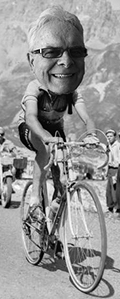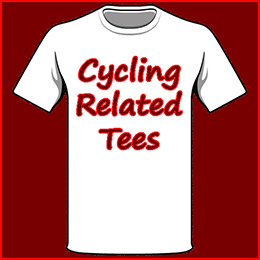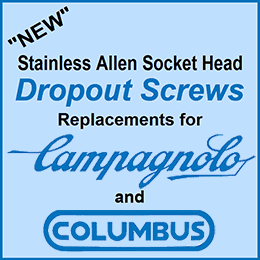Raymond Poulidor: A Working Class Hero
 Mon, April 8, 2019
Mon, April 8, 2019  Raymond Poulidor never won the Tour de France, or for that matter never wore the race leader's Yellow Jersey during any of the Tours.
Raymond Poulidor never won the Tour de France, or for that matter never wore the race leader's Yellow Jersey during any of the Tours.
He did place second in 1964, 1965, and 1974, and placed third in 1962, 1966, 1969, 1972, and 1976. He entered the Tour de France 14 times and finished 12 times, he was consistently in the top ten.
He had a longer career than is usual for a professional cyclist. His first major victory was in the classic Milan-San Remo in 1961. His third place in the Tour in 1976, came at age 40.
 His inability to win the Tour de France won him the nick-name in the press as the "Eternal Second." However in spite of this he was immensely popular with the French public, and was more often than not known affectionately as "Pou Pou."
His inability to win the Tour de France won him the nick-name in the press as the "Eternal Second." However in spite of this he was immensely popular with the French public, and was more often than not known affectionately as "Pou Pou."
During the first part of his career, Poulidor had to race against Jacques Anquetil, and although the former could get the better of Anquetil on the bigger climbs, he lacked Anquetil's tactical ability, especially in the discipline of the time-trial. Poulidor’s riding style was aggressive and attacking, whereas Anquetil would control the race in the climbing stages, then win in the time trial.
 There was always intense rivalry between these two riders. (Pictured together, left.) Anquetil was the top French rider of his day, and it always irked him that Poulidor was in many ways more popular with the French public, and was often given more favorable coverage in the French press.
There was always intense rivalry between these two riders. (Pictured together, left.) Anquetil was the top French rider of his day, and it always irked him that Poulidor was in many ways more popular with the French public, and was often given more favorable coverage in the French press.
For example in 1965, when Poulidor was perceived to have received more credit for dropping Anquetil the previous year on the Puy-de-Dôme than Anquetil had received for winning the whole Tour.
Long after their retirement, Jacques Anquetil and Raymond Poulidor would finally become friends. Anquetil died of stomach cancer in 1987, and the day before he died, he told Poulidor, “Once again my friend you will be second to me.”
When Anquetil retired, Poulidor faced a second nemesis in a young Eddy Merckx. The “Eternal Second” label continued. In 1974 at the age of 38, he was second to Merckx, not only in the TDF, but 2nd also in the World Road Championship that year.
Incidentally, Poulidor also placed 3rd in the World Championships in 1961, 1964, and 1966. He does hold one record, in that he finished in the top three in the Tour de France no fewer than eight times. No one has done that before or since.

Today Raymond Poulidor is still immensely popular with the French people, making regular appearances at the Tour de France and other races. Seen above singing autographs in recent years.
A national survey in 1991 asked the question, which celebrity they would like to invite for a Christmas dinner, a French audience overwhelmingly answered Raymond Poulidor, beating out famous movie stars.
What could be the reason for such popularity? He came from peasant stock, from the farming midlands of France. He speaks with a regional accent. In other words, he is a "Working Class Hero."
There is something about a person who attains success in life, but they retain their "down-to-earth" qualities that the ordinary man on the street can relate to. Think of the continuing popularity of rock stars like Bruce Springsteen or Neil Young, they have that same working class persona.
Or maybe Raymond Poulidor’s popularity was in the fact that he never did win the big one, but at the same time never gave up trying. The world will always admire such spirit, that of the underdog.






















Bikes and Auto Insurance: Do they run on the same business model?
I explain that I built frames that either had the ‘dave moulton’ name on them, or Fuso, or Recherché. And when these frames were later built up into a bicycle, the assembled item became a ‘dave moulton, Fuso or Recherché bicycle.
I further explained that the bike business is not like the auto or motorcycle industry, where a company manufactures all the parts, and then assembles them into a car or motorcycle. When it comes to high end bicycles the components are either Shimano, Campagnolo, or Sram. And even the lower priced bikes are mostly built up with the lower priced Shimano groups.
Even the big three American companies, Trek, Cannondale and Specialized design and produce a frame with their company name on it, and that’s it. All three companies’ bikes are then built up with Shimano, Campagnolo, or Sram and the end consumer gets to decide which he/she wants.
Notice I said the Big Three “Produce” a frame. With a few exceptions they don’t actually make it. That is done in a factory in China or Taiwan, and it is possible that some of these different brands are made in the same factory. Frame design is pretty standard these days, same angles, tube lengths, fork rake, etc. No one is going out on a limb to make anything too radical.
So all three are basically selling the same item, each is no better, no worse than the other. This is why there is so much spent on marketing, the cost of which gets added to the cost of the bicycle, and passed on down to the end consumer. In most cases the consumer gladly pays this price because the marketing has convinced him that it should cost this much for the very best bike.
It occurred to me that this business model is not far removed from that of the large auto insurance companies. The Big Three bike companies assemble a bicycle with a frame that costs about the same as their competitors’ frame, with the same components that also have a fixed cost.
The Insurance companies assemble a package of insurance services that boil down to the same repairs carried out by independent body shops all over the US, at the same basic cost. The reason we see so much advertising on TV for auto insurance is because these companies are all going after the same consumer.
The one who spends the most on marketing, convinces the consumer that their insurance is the best, when if the truth be known, each is probably no better, no worse than the rest.
Part of bike marketing is supporting a professional team, which is a tremendous cost, Specialized does not support a team, but is an equipment supplier only. Cannondale used to have a team, but had to give up when costs got too high, and like Specialized stay in the sport as equipment supplier In other words, they are co-sponsors of teams.
This just leaves Trek with a fully sponsored factory team. So it will be interesting to see if they will continue to support a complete team. And if so, will their product cost more, and will it be perceived as better?